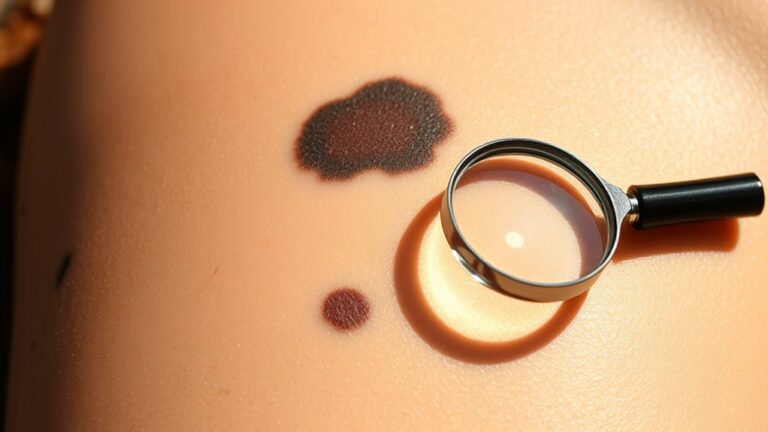You wake up drained despite a full night’s sleep, your energy sapped like a phone stuck at 1%. This isn’t just tiredness—it could be your body whispering something’s off. Leukemia often masks itself behind everyday struggles, from unexplained bruises that linger like bad memories to fevers that flare up without warning. Spotting these signs promptly could be the difference between catching a problem and letting it spiral—so what else should you watch for?
Persistent Fatigue and Weakness
Should you have been feeling exhausted no matter how much one rests, it could be more than just everyday tiredness.
Persistent fatigue and weakness are key leukemia symptoms, often caused by anemia—a shortage of healthy red blood cells that carry oxygen. Without enough of them, your body struggles, leaving you drained even after sleep.
Leukemia also produces abnormal white blood cells, crowding out the healthy ones and weakening your immune system. This makes infections harder to fight, adding to the exhaustion.
Unlike normal tiredness, this fatigue doesn’t fade with rest and can disrupt daily life.
Should one be constantly worn out, especially with other concerning signs, don’t ignore it. Talk to a doctor—early checks matter. Simple blood tests can spot issues before they worsen.
Frequent Infections and Fevers
Because your immune system isn’t functioning as it should, frequent infections and fevers can be a red flag for leukemia.
At the time abnormal white blood cells crowd out healthy ones, your body struggles to fight off germs, raising your risk of infections. You may notice persistent fevers, even in the case that they’re low-grade, or infections that keep coming back or take longer to heal.
Night sweats often accompany these fevers, leaving you drenched without explanation. These blood abnormalities aren’t just minor inconveniences—they’re signs your immune system needs help.
Should you be battling constant sickness or unexplained fevers, don’t brush it off. A medical evaluation can pinpoint whether leukemia or another condition is behind it.
Prompt detection makes a difference, so listen to your body and seek answers.
Unexplained Weight Loss
In case you’ve noticed the numbers on the scale dropping without changes to your diet or exercise, it could be a sign of leukemia. Unexplained weight loss is one of the key symptoms of leukemia, often linked to the body’s increased metabolic demands as it fights the disease. You could also experience appetite changes or muscle mass loss, leading to a significant decline in overall health. Acute leukemia can cause rapid weight loss, while chronic leukemia may lead to a slower, more gradual drop, sometimes caught during routine blood tests.
| Type of Leukemia | Weight Loss Speed | Common Signs |
|---|---|---|
| Acute Leukemia | Rapid | Severe decline, fatigue |
| Chronic Leukemia | Gradual | Mild, often unnoticed |
| Both Types | Varies | Loss of muscle mass |
| Both Types | Varies | Appetite changes |
| Both Types | Varies | Detected in blood tests |
If you’re losing weight without trying, it’s worth discussing with your doctor.
Easy Bruising or Bleeding
You may notice bruises appearing easily without understanding how you got them, or you could have nosebleeds that won’t stop even after applying pressure.
Should your gums bleed excessively after brushing or flossing at times they normally wouldn’t, it could be a sign something’s off.
These symptoms often happen because leukemia affects your body’s ability to clot blood properly.
Frequent Unexplained Bruising
Though bruises usually happen after a bump or fall, frequent unexplained bruising—especially without any clear cause—can signal a deeper issue like leukemia. As your platelet counts drop due to this blood disorder, your body struggles to stop bleeding, leading to spontaneous bruises or tiny red spots called petechiae. You may notice them on your arms, legs, or elsewhere, even without injury.
| What You Notice | What It Could Mean |
|---|---|
| Bruises appearing often | Low platelet counts |
| Tiny red spots (petechiae) | Bleeding issues |
| Bruises without cause | Possible leukemia symptoms |
| Bleeding that won’t stop | Needs further investigation |
If you’re experiencing these signs, don’t ignore them. Talk to a healthcare professional to rule out serious conditions.
Persistent Nosebleeds
Whenever persistent nosebleeds keep occurring without a clear reason, it may indicate something more serious, like leukemia. Your body relies on platelets to stop bleeding, and whenever leukemia lowers your platelet count (thrombocytopenia), even minor issues can cause trouble.
Here’s what to watch for:
- Frequent or heavy nosebleeds: Should they last longer than usual or happen often, it may signal low platelets.
- Easy bruising: You may notice bruises from small bumps, a sign your blood isn’t clotting correctly.
- Petechiae: Tiny red or purple dots on your skin from small bleeds beneath the surface.
- Uncontrollable bleeding: Should pressing on your nose not stop the flow, it’s time to see a healthcare provider.
Don’t ignore these symptoms—your blood could be telling you something significant.
Excessive Bleeding Gums
Because leukemia affects your blood’s ability to clot, even minor irritation—like brushing your teeth—can make your gums bleed more than usual. This excessive bleeding happens due to thrombocytopenia, a low platelet count that makes it harder for your body to stop bleeding.
You may notice spontaneous bleeding from your gums or tiny red spots called petechiae on your skin. Easy bruising is another sign—simple bumps can leave large, dark marks that take longer to heal.
Should you be a leukemia patient, maintaining good oral hygiene is key, but be gentle to avoid worsening blood clotting issues. Don’t ignore these symptoms; they’re your body’s way of signaling something’s off.
Talk to your doctor should bleeding or bruising occur often without a clear cause.
Shortness of Breath During Routine Activities
Should you have observed yourself gasping for air after simple tasks like walking or climbing stairs, it could be more than just fatigue—it could signal anemia linked to leukemia.
Once your body lacks enough healthy red blood cells to carry oxygen, even routine activities can leave you winded. Here’s what you need to know:
- Anemia’s Role: Leukemia disrupts red blood cell production, leading to anemia. Without enough oxygen, you’ll feel shortness of breath and fatigue.
- Dizziness Warning: In the event dizziness joins the mix, your body’s struggling harder than usual—don’t ignore it.
- Immune System Strain: Cancer weakens your immune system, making recovery slower and breathlessness worse.
- At What Point to Act: Persistent symptoms? See a healthcare professional to rule out fundamental health issues.
Listen to your body—it’s often the initial to sound the alarm.
Night Sweats and Swollen Lymph Nodes
You may notice night sweats soaking your sheets, often from your body reacting to abnormal cell production or infections linked to leukemia.
Swollen lymph nodes can feel tender or appear as lumps, signaling leukemic cells gathering in those areas.
These symptoms, whether mild or persistent, are worth checking with your doctor to rule out serious causes.
Causes of Night Sweats
At the time leukemia affects your body, night sweats often become more than just a minor inconvenience—they’re a sign your immune system is working overtime. Here’s what’s happening:
- Abnormal white blood cells crowd out healthy ones, forcing your body to fight harder, which can trigger intense night sweats.
- Leukemic cells spread, confusing your immune system and causing it to overreact, leading to excessive sweating.
- Your swollen lymph nodes signal your body’s struggle to filter these rogue cells, adding to the stress that fuels night sweats.
- Should these sweats be frequent or severe, it could point to advanced disease, making prompt medical evaluation essential.
Don’t dismiss drenching sweats as just stress or a minor bug—your healthcare provider can do a thorough assessment to rule out infections or other causes.
Paying attention to these signs guarantees you get the right help soon.
Lymph Node Swelling Impact
Swollen lymph nodes and night sweats often show up together as leukemia disrupts your body’s normal functions. At the time abnormal blood cells multiply, your immune response kicks in, causing lymph nodes in your neck, armpits, or groin to swell and feel tender.
These symptoms, paired with drenching night sweats, suggest heightened leukemic activity, especially in acute forms of leukemia. You may also notice fatigue or fever, which can feel like a stubborn infection but could signal something more serious.
In case these signs persist, don’t ignore them—seek urgent medical consultation. Timely evaluation helps pinpoint the cause, whether it’s leukemia or another condition, and speeds up access to cancer treatment as required.
Trust your body’s signals and act on them.




